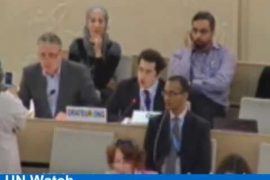1) At the Misgav Institute, Arsen Ostrovsky explains ‘The Law Of Exploding Pagers’.
“Last week the world watched as the terrorist army Hezbollah was hit by an attack that was equal parts debilitating and humiliating. On Tuesday, September 17, the special pagers carried by Hezbollah operatives suddenly exploded. Then, on Wednesday, their walkie talkies literally blew up.
Although Israel has not claimed responsibility for the operation, in the event they did carry out this historically unprecedented strike, it was entirely justified and in full accordance with international law.
It is not surprising that it did not take long for the usual chorus of anti-Israel politicians and pundits — those who only remember International Humanitarian Law (IHL) whenever they think it might hurt the Jewish State — to find some obscure provision, divorced from context, that they might deceptively latch onto and accuse Israel of violating, knowing full well that the uneducated armchair ‘experts’ who blindly follow them would thoughtlessly amplify their claims, muddy the waters of good vs. evil, and somehow make Israel the bad guy again.”
2) Dave Rich discusses ‘Israel’s always-critics’.
“There are a lot of people who were appalled by the Hamas atrocities on October 7 and have no time for terrorism, and who are also horrified by the scale of suffering in Gaza and have called on Israel to find a different way, to negotiate a ceasefire, to take more care over the lives and humanitarian needs of Gazan civilians. These are legitimate – you might say essential – issues to discuss and disagree over, but that’s not what is happening here. The always-critics never acknowledge Israel might have a point, that a threat to it might be real and not of Israel’s own making, that sometimes, just sometimes, Israel isn’t the bad guy in the story.”
3) At WINEP, Mathew Levitt analyses ‘The Death of (Another) Hezbollah Lifer’.
“In April 1985, CIA analysts penned a report titled “Wild, Wild West Beirut,” in which they described how the city’s west side had become riddled with daily turf battles involving the use of car bombs, mortars, and rocket-propelled grenades. It also warned that “West Beirut has earned the reputation of being the most dangerous city in the world for foreigners, especially Americans and Europeans.” One of the key people behind this violence was Ibrahim Aqil (aka Tahsin).”
4) At the Alma Center, Yaakov Lappin and Sarit Zehavi look at ‘The Middle East’s strategic crossroads: 4 possible Scenarios’.
“…Iran has been activating its multiple proxies, Hezbollah in Lebanon, Shi’ite militias in Syria and Iraq, and the Houthis in Yemen to attack Israel from October 8 onwards, a day after Hamas’s mass murder attack on southern Israel, for the purpose of creating a long war of attrition.
Iran has been ordering Hezbollah and its other proxies to wage a war of attrition on Israel in order to extort it into withdrawing fully from Gaza, which would save its ally, Hamas. Israel, on the other hand, appears to be signaling to the Iranian – Hezbollah axis that the time of attrition is over, and that the only two choices on the table are either a diplomatic arrangement and enforcement of Resolution 1701, or an escalation of the already escalating conflict.”
5) At the Moshe Dayan Center, Dr. Hay Eytan Cohen Yanarocak explains ‘How Pan-Islamism Took Over Turkey’s Secular Education System’.
“Since the beginning of the Hamas-provoked war in Gaza on October 7, the steady deterioration in Israeli-Turkish relations has been in full throttle. Following Turkish President Recep Tayyip Erdoğan’s strong declaration of support for Hamas on October 25, bilateral relations have suffered unprecedented setbacks. The suspension of the airbridge and tourism, as well as the cutting of bilateral trade relations, have significantly damaged people-to-people relations.
However, it seems that none of the harsh steps above will have as long-term of an effect as the latest step taken by the Turkish Ministry of National Education. In an official statement which was later officially announced in his ministry’s website, the Turkish Minister of National Education Yusuf Tekin, stated that he has instructed schools to begin classes on September 9 with an opening lesson titled “From Çanakkale (Gallipoli) to Gaza: Homeland Defense and the Struggle for Independence” to raise awareness of the so-called Israeli oppression.”





